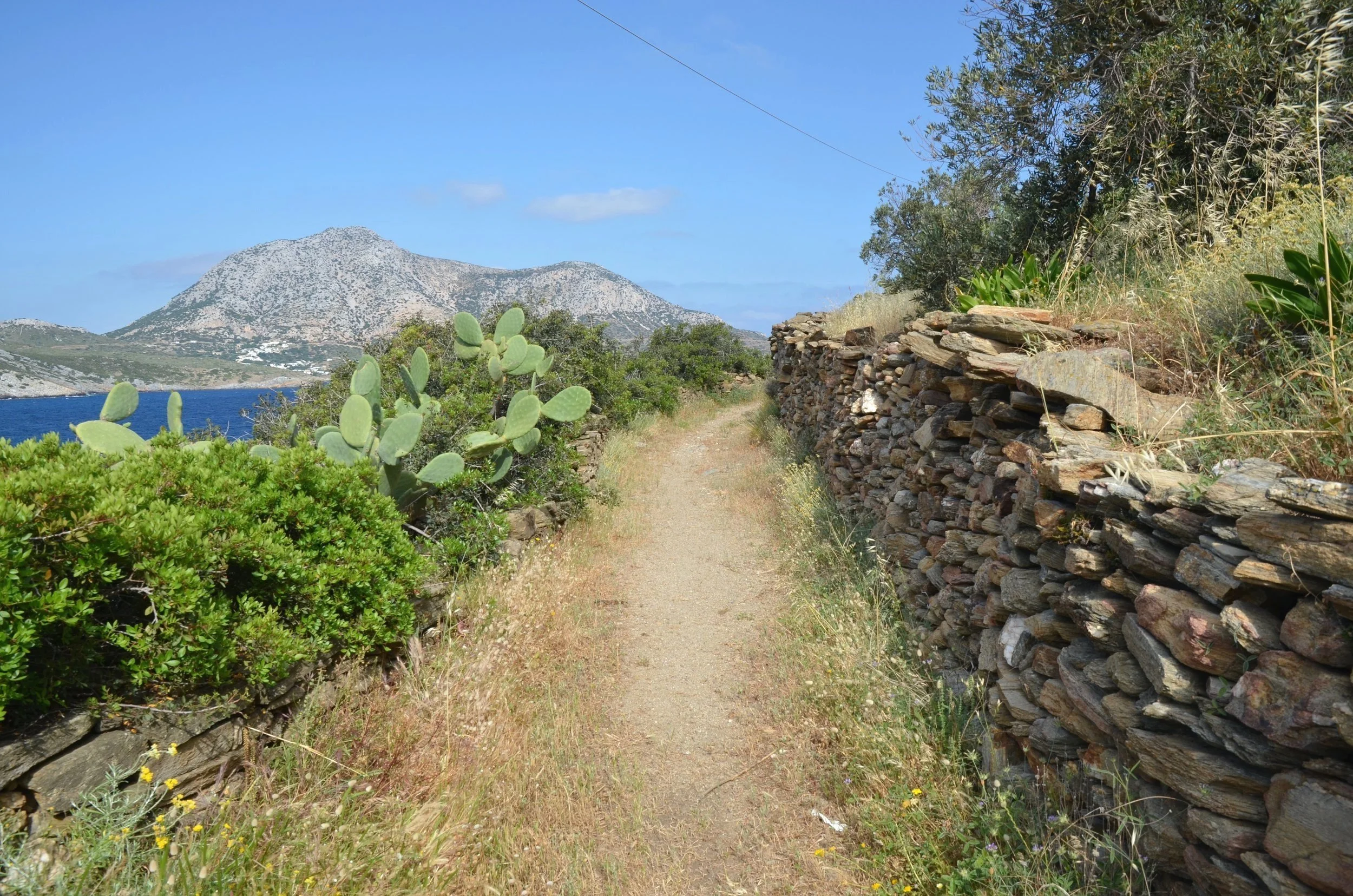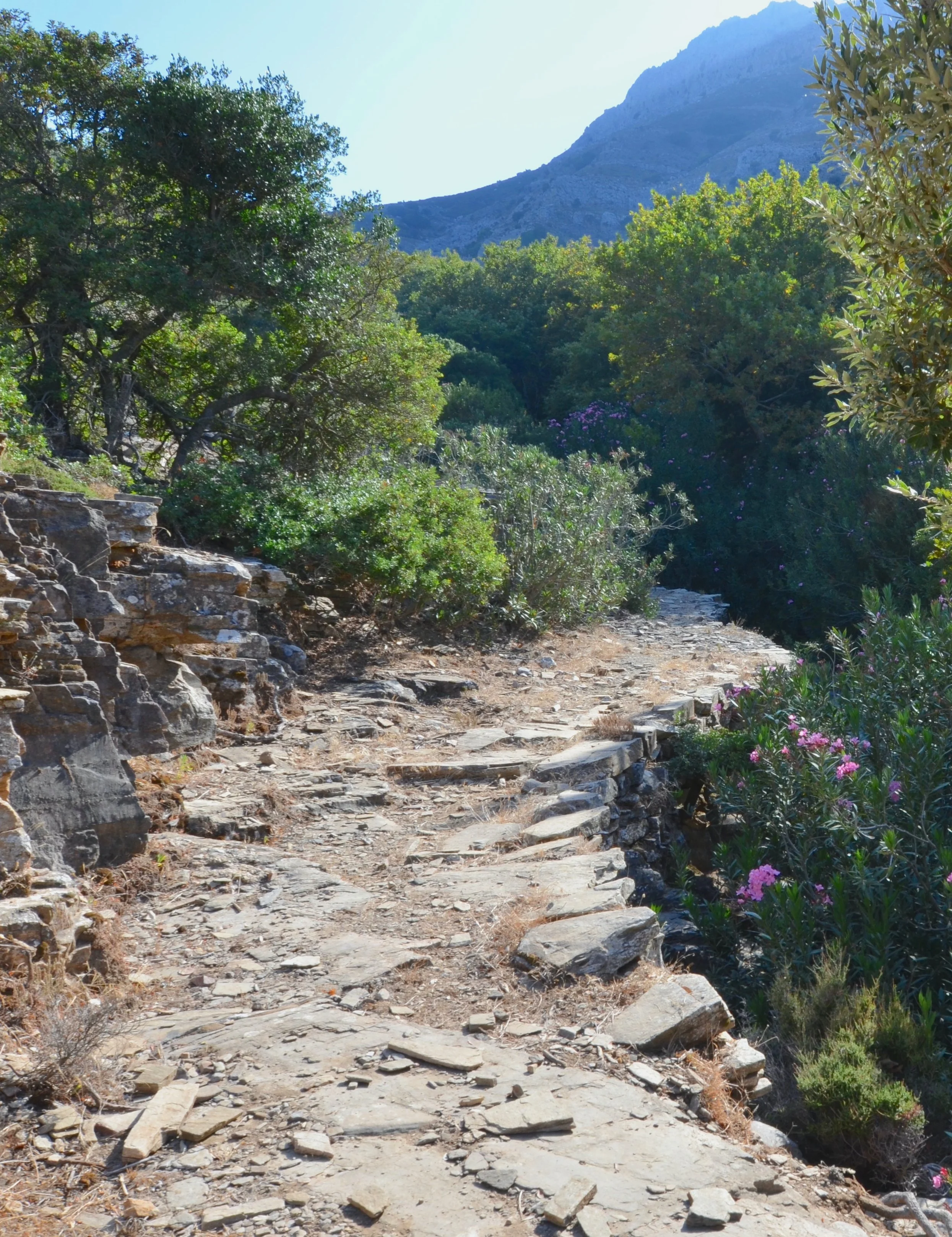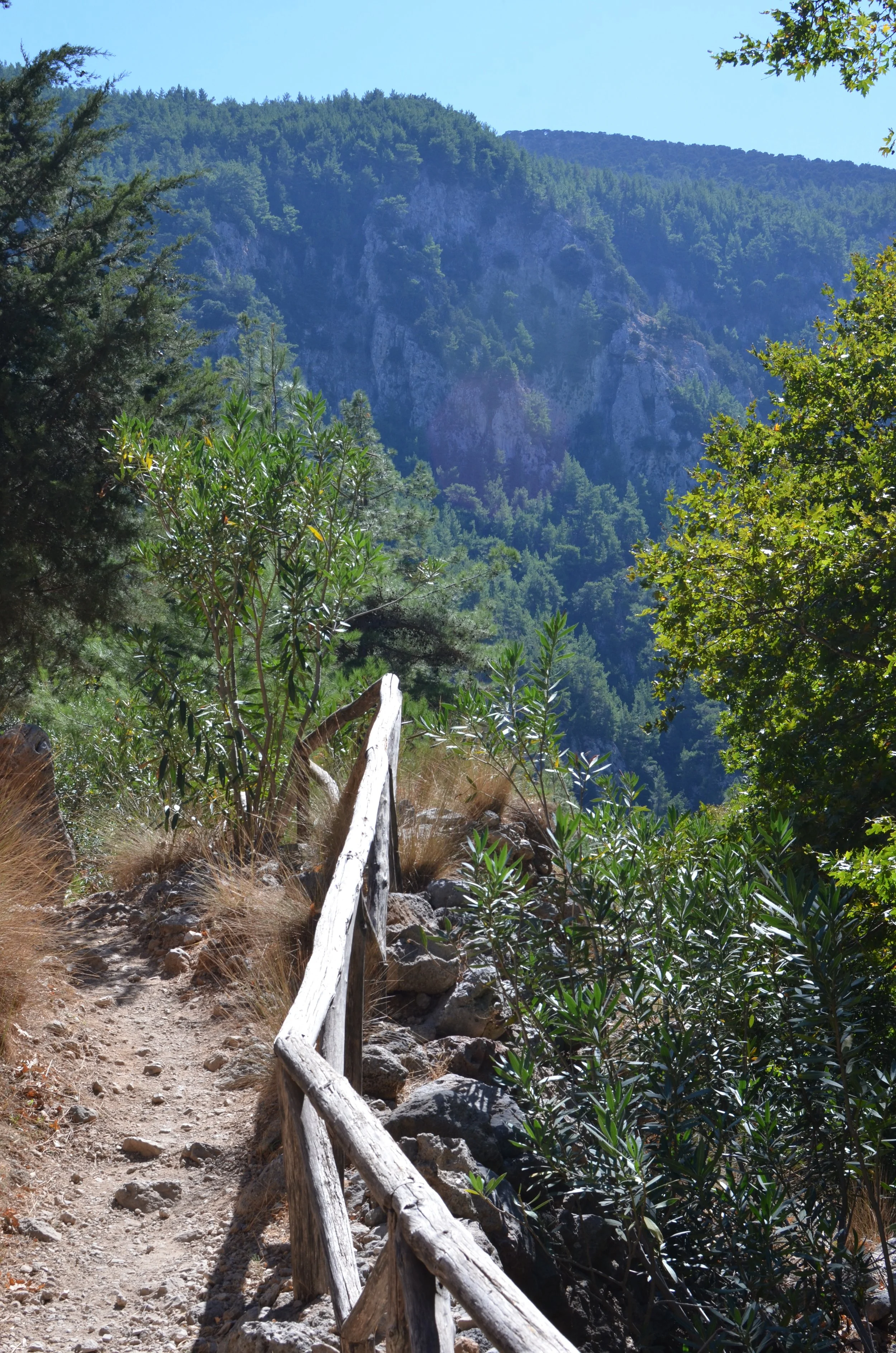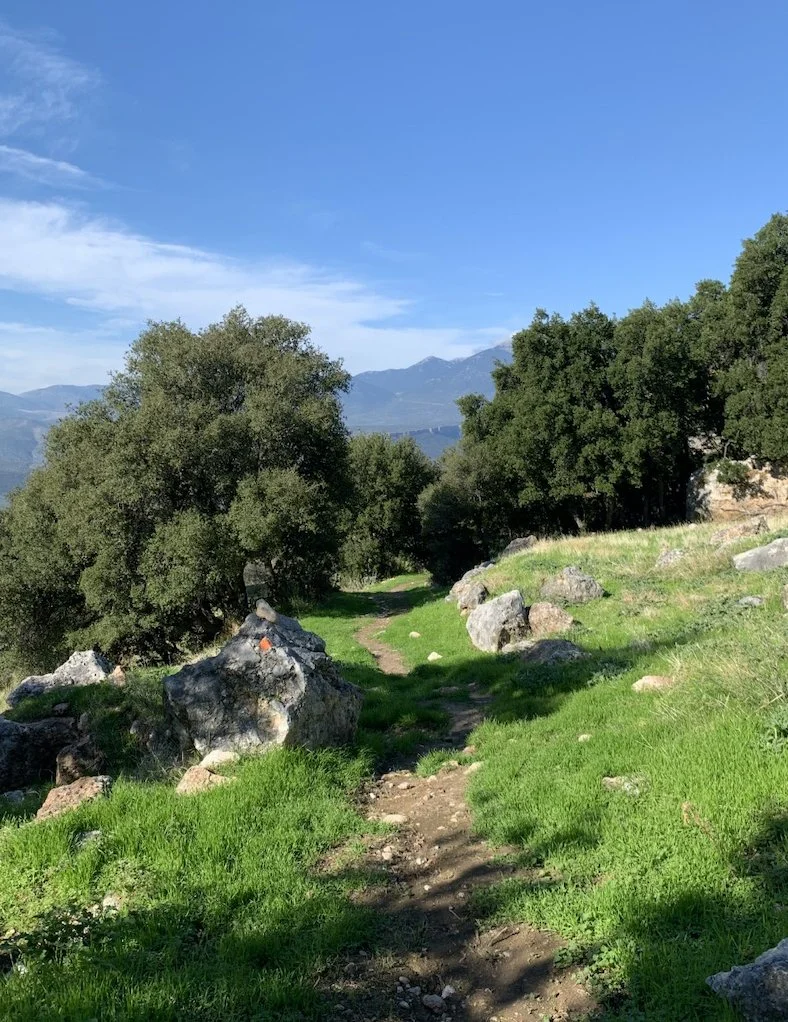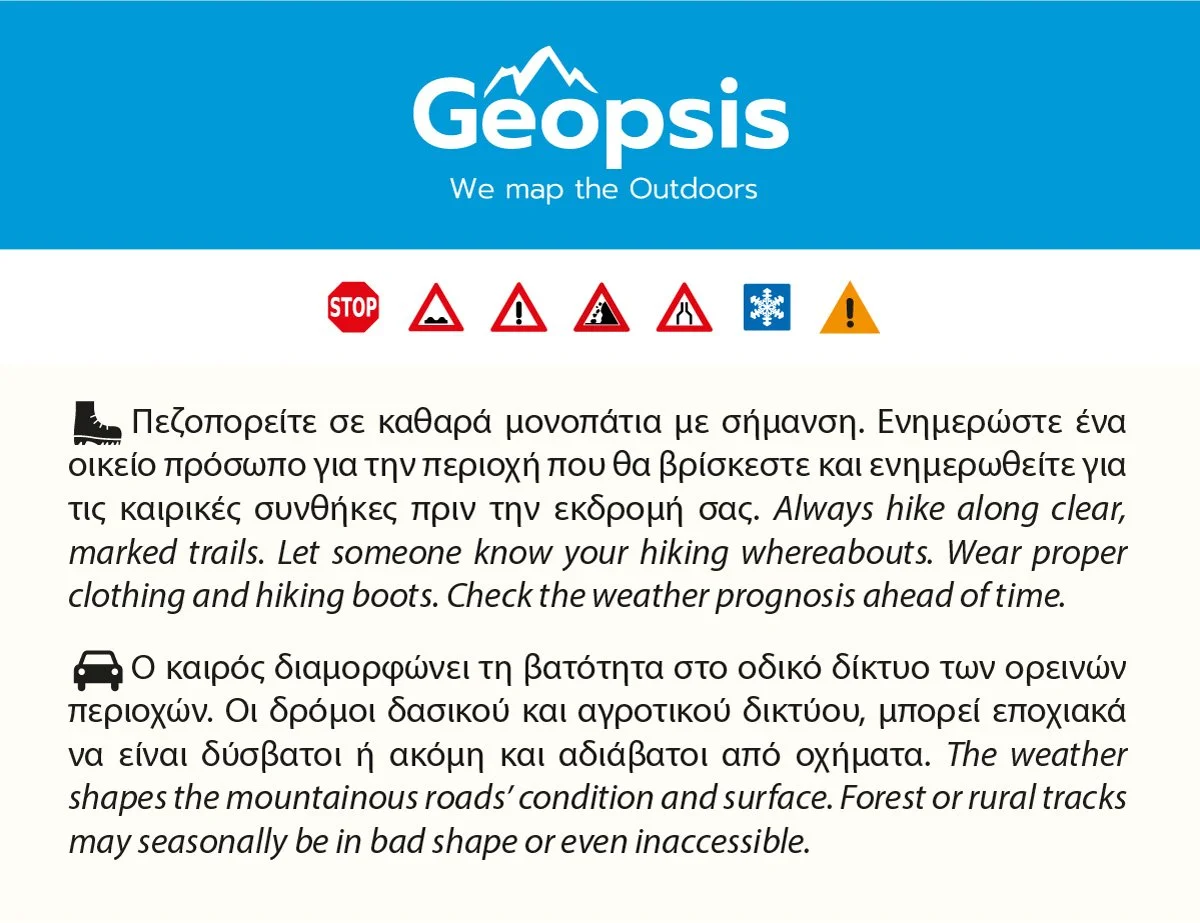Fournoi Island - A coastal walking path
Hiking in Greece is extraordinary! Footpaths lead to incredible ruins, rivers, canyons, local villages, wild goat and sheep crossings, sweeping views, scents of wild herbs, mountain peaks, sounds of nature, and the list goes on. Footpaths are often the old traditional routes of travel on many islands.
But hiking/walking in Greece has some serious risks that you must Prepare For and Stay Alert to.
Ikaria Island - a mountain walking path leading to hidden village ruins. See the Ikaria Guidebook.
Blazing hot temperatures (in summer), intense and often constant sun exposure, thorny and scratchy bushes, rocky terrain, cliff landslides, and overgrown paths can quickly disorientate you and erupt into life threatening situations.
Prepare, Prepare, Prepare!
The planning and packing tips below are MUCH more important than what bathing suit you bring or flip flops you pack. They may just save your life.
Avoid the high Summer heat!
If you plan to do walking/hiking in Greece, do not visit Greece in high summer. The dry blistering heat and the blazing sun can snag you faster than you’ll know, and ultimately get you in grave danger. Are there any locals walking on the paths during these times? Probably not and for good reason.
Heat stroke is a real thing and happens every year to even seasoned hikers. Read up on it. Know what it is. It’s not pretty and you’ll realize you really do not want to come anywhere close to getting heat stroke.
Cancel any planned walk(s) when it’s too hot! Anything above 23 C / 75 F is too hot for a sun exposure walk. On mlld summer days (which are becoming less frequent in Greece), you may find some cool hours in the morning and evening. Hikes from 6am to 10am and 4pm to 7pm may be suitable on cooler days.
April, May, September, October - these are often good hiking months in Greece. Also, flights are cheaper and hotels are not in their high season prices.
Bring Water/Cooling Rags/Snacks
(You have to keep a cool temperature, hydrated, and nourished at all times)
The Agia Irini gorge trail on Crete
Carry Lots of water. Carry 3x more water than you think you’ll need. Don’t carry a plastic bottle that gets hot in the sun, but a thermos that holds cold temperature and pack it with ice water. At night, drink lots of water when you are relaxing at a taverna. In the morning, drink more water at breakfast. Drink lots of water. Water.
If you can, put some ice into your water bottles to keep the water cool in case you need to pour some on a rag and cool up your neck and face.
Carry a cooling rag. Google cooling towels/rags for hiking. Pack one and hike with it.
Avoid alcohol when you aren’t walking or hiking. Prepare for walks/hikes ALL day, even when you are off the trails.
Carry energy bars and snacks. You will get hungry quicker than you realize.
Make sure to drive/ park safely on secondary roads. Your car needs to stay safe too.
Pack Proper Clothes and Gear
Thorny bushes grow wild in Greece and creep over footpaths. Without long pants the thorns rip into your ankles and legs.
You’ll need hiking/ walking shoes. Flip flops or open sandals won’t do it.
You’ll need long pants and long sleeves. Protect your skin from sun exposure and long loose light clothes also help keep you hydrated. Wear a light color (not black).
You’ll need to have your legs and ankles covered. This is another reason to wear pants. Low bushes in Greece have long thick thorns.
Wear a hat and sunscreen. Keep the sun off your skin in all areas as much as possible.
In Fall/Winter/Early Spring, pack light rain clothes and layers.
A hiking trail near Delphi
Some Product Suggestions on What to Bring (Click on link):
Hydration ‘bladder’ for hiking backpack
Light Hiking Pants (Women)
Light Hiking Pants (Men)
Important hiking information from the map maker, www.geopsis.com.
Stay on Track While you are Hiking
Symi Island - A Coastal Walking Path
Many goats will greet you on Greece’s walking paths!
Make sure you have a proper map/ walking guidebook and have consulted locals about the paths. Just because you see footpath signs doesn’t automatically mean that the footpath is safe to walk. Paths are often maintained by locals - when they get the time to do so. (Maps for some destinations in Greece are sold by www.geopsis.com. For Ikaria, get the Ikaria Guidebook.)
Hike with a phone or device that can always call out emergency numbers.
112 is the emergency number in Greece. Memorize it now. 112.
Consider carrying a SOS device like the Garmin Satellite Communicator
Watch your footing over rocks. The land on islands is full of small loose rocks. Don’t assume that any rock is secure in the ground.
Do not stand close to edges over rocks. Assume that the rocks you intend to step on might be unstable and might crumble if you step on them.
Never hike alone. Most accidents happen when people are hiking alone and cannot quickly get help.
Let someone who is not hiking with you know your route path and destination.
Don’t wander onto old paths to see where they might go. The Greek islands are filled with hundreds of old paths that can spin you into a mess of confusion. Assume splinter and old paths are overgrown. None of the islands are huge, but the footpaths twist and turn and in effect are extremely long and many are impossible to navigate if you get lost.
The very first instant you feel slightly off, dizzy or disoriented, STOP and CALL 112. Treat every moment as critical. It’s better to be overly cautious.
Don’t play Indiana Jones and try to climb over cliff landslides or other dangerous areas. It’s just not worth it. A local wouldn’t do it. You shouldn’t do it.

